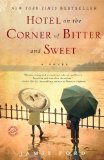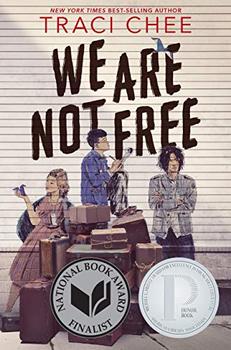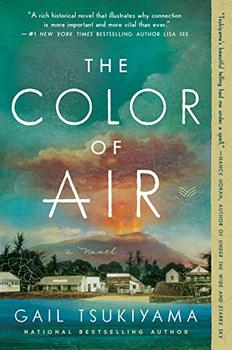Summary | Excerpt | Reading Guide | Reviews | Beyond the book | Read-Alikes | Genres & Themes | Author Bio

A Novel
by Jamie FordHotel on the Corner of Bitter and Sweet begins with a real-life event: The 1986 discovery in Seattle's Panama Hotel of the belongings of thirty-seven Japanese families, stored there for safe-keeping in 1942. As one would expect, much of the novel revolves around events just before and just after American residents of Japanese descent were forcibly relocated during WWII. As historical fiction, the book is top-notch; Ford's insertion of references to historic Seattle landmarks, locations and events create a heightened sense of realism. He also does an exemplary job of describing the atmosphere of Seattle's Chinatown in the 1940s.
"The entire city came alive in the morning. Men in fish-stained T-shirts hauled crates of rock cod and buckets of geoduck clams, half-buried in ice. Henry walked by, listening to the men bark at each other in a Chinese dialect even he didn't understand… He continued west on Jackson Street, past a flower cart and a fortune-teller selling lucky lottery numbers, instead of going east in the direction of the Chinese school that was only three blocks from the second floor apartment he shared with his parents."
While history is an important part of this book, it's not its primary focus.
This book is really about relationships, and that's what gives it such universal
appeal. Interactions between people are complex, and the closer one is to
someone, the more complicated communication can be. Ford hits the perfect note
as he depicts the important relationships in Henry's life. His descriptions of
how Henry and his father communicate (or, more accurately, don't communicate)
are spot on, as is the description of the innocent love that Henry develops for
Keiko. Ford so neatly captures the 12-year-old's thoughts that readers can't
help but empathize with Henry's awkwardness and confusion about his feelings for
his friend.
Ford also shows great insight in having his protagonist realize later in life
that he's communicating with his son in exactly the same way he had communicated
with his father (that is, not very well at all). Again, Henry's emotions ring so
true that readers may find themselves smiling and nodding with recognition,
having had similar experiences in their own lives. Ford perfectly and with great
depth portrays Henry's interaction with various members of his community:
playground bullies, a black street musician who becomes a lifelong friend, a
gruff but kind cafeteria cook and others. Although in some cases the characters
are a bit stereotypical, they're drawn with such a fine brush that few readers
will mind.
There are a few minor flaws in this otherwise stellar work. Henry and Keiko are
depicted as twelve and thirteen. Their actions and communication, however, seem
too mature for children of that age, particularly in Henry's case. Also, the
parts of the book that are supposed to be set in the mid-1980s contain a couple of important details that would seem to set these sections more in the 21st
century than in the time period the author intends.
This aside, Hotel on the Corner of Bitter and Sweet is
an exceptionally well-written historical fiction novel with many complex themes
intertwined throughout the narrative. Its multifaceted, well-paced plot is sure
to put it at the top of many a book club's reading list, and it is likely to
attract a wide audience. Highly recommended!
More about this book
Images: Top Right: Residents of Block 21, Minidoka Internment Camp, Idaho (1943). Bottom Right: An American soldier of Japanese ancestry at the railroad station of a small town in an agricultural community. He and nine other service men of Japanese ancestry received furloughs to enable them to come home to assist their families get ready for evacuation from their west coast homes.
![]() This review was originally published in The BookBrowse Review in February 2009, and has been updated for the
November 2009 edition.
Click here to go to this issue.
This review was originally published in The BookBrowse Review in February 2009, and has been updated for the
November 2009 edition.
Click here to go to this issue.

If you liked Hotel on the Corner of Bitter and Sweet, try these:

by Traci Chee
Published 2022
"All around me, my friends are talking, joking, laughing. Outside is the camp, the barbed wire, the guard towers, the city, the country that hates us.
We are not free.
But we are not alone."

by Gail Tsukiyama
Published 2021
From the New York Times bestselling author of Women of the Silk and The Samurai's Garden comes a gorgeous and evocative historical novel about a Japanese-American family set against the backdrop of Hawai'i's sugar plantations.
Your guide toexceptional books
BookBrowse seeks out and recommends the best in contemporary fiction and nonfiction—books that not only engage and entertain but also deepen our understanding of ourselves and the world around us.